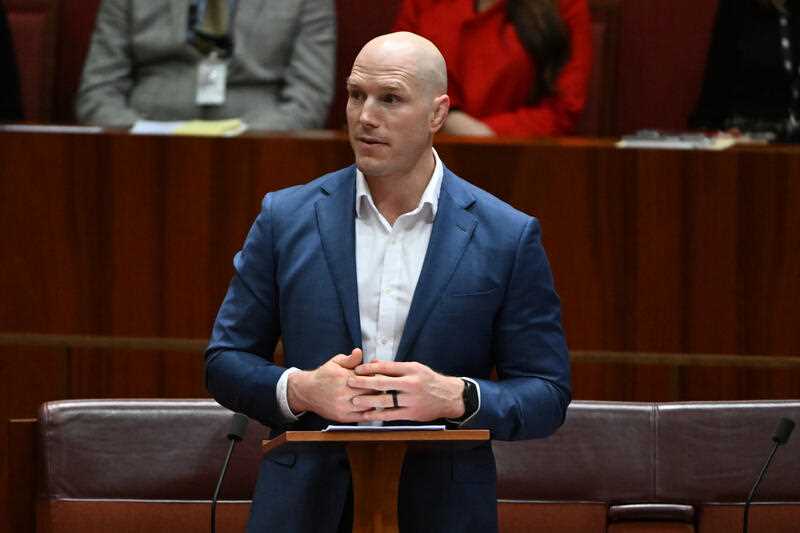As the ACT’s first Independent Senator, David Pocock, sworn in last week, is also Canberra’s first politician to sit on the crossbench and hold the balance of power.
“I intend to use that power in the best interests of the people of the ACT,” he said in his maiden speech yesterday.
“For too long, we have been neglected, ridiculed, looked down on, or flat out ignored. We’re the nation’s capital. I want this to once again be a source of great pride. No longer are we a safe seat.”
The Zimbabwe-born former rugby giant was elected in June, replacing Liberal Zed Seselja.
“I want to be a peace broker in the 47th Parliament,” Senator Pocock declared. “The challenges facing us are so important.”
- New ACT Senator David Pocock thanks team, AEC (15 June)
- And he scores!: David Pocock is new Senator (14 June)
- David Pocock has his eye on the ball (26 May)
The ACT faced a housing crisis; a shortage of healthcare workers; businesses struggling to find staff; elderly citizens neglected in aged care facilities; the cost of living creating a new class of working poor and working homeless in suburbs; difficulty accessing mental health services; insecure work leaving Canberrans vulnerable to rapidly changing economic conditions.
Senator Pocock promised to secure more investment for infrastructure; more equitable representation; and continue the ACT’s “legacy of leadership – on everything from marriage equality to the smart energy transition that we so desperately need to accelerate”.
The new senator is also a dedicated environmentalist, and he warned of climate change causing extreme heat and bushfires, severe weather events, and species extinction, and of invasive species destroying habitats and wildlife.
“Today, the systems that sustain life on earth are at the brink of collapse. The climate as we know it is breaking down, and the impacts are now being felt with distressing regularity. Extreme weather: drought, bushfires, hailstorms, and floods are having a devastating effect on the people and places we love.”
But he is also optimistic. He believes Australia can lead on climate action and biodiversity conservation.
“It’s on us to make the changes, and it’s not too late,” he said. “In the midst of this doom and gloom is an invitation to begin to turn things around. Thanks to ancient Indigenous wisdom and the latest in science and technology, we have never known more about these life support systems, what we are doing to them, and what can and must be done to halt this catastrophic decline and begin to reverse it…
“It seems to me that a big part of politics is about dealing with problems in a way that turns them into opportunities…
“This is not about naïve thinking or hoping for the best – it’s about a new kind of pragmatism where our actions match the scale of the challenge.”
Senator Pocock also reiterated his commitment to territory rights, and promised to support Alicia Payne MP and Luke Gosling MP’s bill for the ACT and NT to legislate on voluntary assisted dying, which passed the House of Representatives this morning.
- Lower house supports territory rights (3 August)
“Here in the ACT, we have been denied rights held by the States. It is time for us to restore the right of the territories to make decisions for themselves… I will work with everyone in the Senate Chamber to support a vote giving us equality with the states.”
He also believes Parliament must restore Australians’ faith in government and governance; he is concerned trust in political institutions is worryingly low.
“We have a real chance to strengthen our democracy and ensure Australians can trust in the decisions that are being made in their name.”
His proposed solutions include increasing transparency; implementing a robust integrity commission; reforming political donations; truth in political advertising laws (Advance Australia, a conservative political advocacy group, targeted him with misleading advertisements); greater protection for whistleblowers; and enshrining a First Nations Voice to Parliament in the constitution.
- David Pocock wants AEC to prosecute Advance Australia (16 May)
- David Pocock lodges complaint for ‘misleading’ election advertising (27 April)
Senator Pocock’s speech was live-translated into Auslan by interpreter Mandy Dolejší, via a screen from a broadcasting studio. He had wanted her in the Senate, but was refused. It was, he said, “the difference between accessibility and inclusion”.
“Today, we have achieved the former, but not the latter. In future, I hope we can achieve both.”



